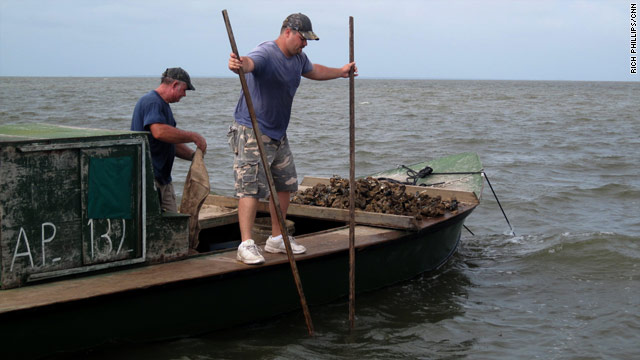


Apalachicola Bay, Florida (CNN) -- You can feel the tension in the air and on the bay -- even on a Sunday.
When you're an oysterman, your day is a long, hard one spent harvesting oysters on the brown water off Florida's big bend -- known as the forgotten coast. Oyster harvesters say that if oil arrives and turns the bay black, their livings will be as good as over.
"If it comes in here, it's going to kill it," oysterman Victor Causey says. "They keep telling me it's getting closer and closer."
So, the race against the black crude is on. State regulators began the harvesting season early this year, and they expanded the work week to six days of harvesting here in this Florida Panhandle town on the Gulf Coast.
"I'm going to get as many [oysters] as I can until it gets here," Causey says.
 Video: Town waits for oil creep up on beach
Video: Town waits for oil creep up on beach  Video: Spill affects prices in Northeast
Video: Spill affects prices in Northeast  Video: Company shows off mat that absorbs oil
Video: Company shows off mat that absorbs oil Oyster harvesters, shrimpers and fishermen have been preparing for the oil that has been leaking from a undersea BP well in the Gulf of Mexico since the Deepwater Horizon explosion in April.
They say their tourism industry is being hurt by the perception that the oil is already here and struggling with the reality that their businesses may soon be covered in oil.
"It really is a big deal to us. This is our way of life," says Saundra Powell of the Franklin County Seafood Task Force. "It's the only thing we know. This is what we want to do, we choose to do this. It's not something we have to do. We want to do it. We love it. This is what we're happy with."
Seafood is an $80 million industry for this small town of just over 2,000 people. Their food is shipped all over the United States, as well as to Canada and the Far East.
Lawrence Peterson isn't optimistic that anything can be done to stop the spill and contain the approaching oil.
He and his son, Stephen, take turns using giant tongs to scoop up oysters from the bottom of the shallow ocean floor. After doing this for 30 years, the elder Peterson can't imagine a new way of life in a town where tourism and seafood dominate the local industry.
On this particular Sunday, the Petersons are trying to fill up as many 60 pound bags as they can. They get about $20 a bag. They've also gotten their check from BP -- $5,000 for the hit their business has taken. But, they say, they doubt they'll be able to get back on the bay for a long time if the oil arrives in its waters.
"Fifteen years plus, if ever, is what I say," Stephen Peterson says.
And others already know that not only are their futures in jeopardy, so are their future addresses. Many of the oystermen are hoping to be hired by BP to help restore the life they fear losing.
"If they can't hire us to clean it up and plant our bay back so we'll have something in the next two years, however long it takes to get it going -- I'm going to have to pack up and leave," Causey says.
Loading weather data ...